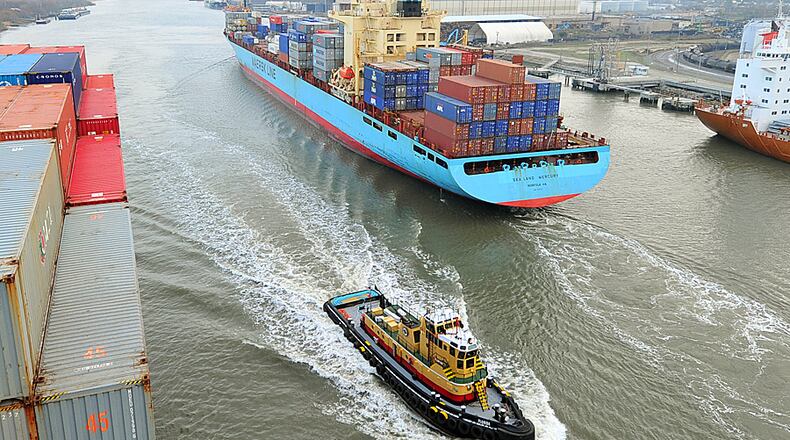Georgia’s leaders are prepared to use state dollars next year to begin the dredging of Savannah’s port, tired of waiting for federal funding to accomplish what Democrats and Republicans alike view as the state’s top economic development priority.
Significant hurdles remain, including congressional changes needed to lift a spending cap that is hobbling the $662 million project, the reawakening of a long-running legal squabble with Florida over regional water rights and no federal commitment to share the cost.
But as Vice President Joe Biden prepares to visit the Savannah port on Monday, a unified political leadership plans to press him to allow the state to start using the more than $200 million it socked away for the project, with or without more immediate funding from Washington.
“This is something that we’ll pursue,” Gov. Nathan Deal told The Atlanta Journal-Constitution. “If the federal government is slow in doing so, which they have been up to this point, then we will press them for permission to let us spend the money we’ve allocated. We’re ready.”
Still, leaders aren’t writing off help from the White House. Atlanta Mayor Kasim Reed, the Georgia Democrat with the closest ties to the Obama administration, told the AJC that he plans to press Biden to “make a significant commitment to this port’s deepening.” He said he feels like the project is at the precipice of success.
“We haven’t been down this road before. We have made more progress working as a team in the last three years than has been made in the previous nine,” Reed said. “And we have a president who talks about the deepening of Savannah’s port nationally.”
Added House Speaker David Ralston: “We are ready for this expansion. We remain hopeful that the federal government will choose to partner with us as we make this project a reality.”
The push to carve another 5 feet in depth along a 38-mile channel of the Savannah River and harbor is one of the rare issues that has united Georgia politicians of all stripes. Even Rep. Paul Broun, the GOP Senate candidate known for his budget-cutting votes, considers it a priority.
The port and its cousin in Brunswick support 100,000 metro Atlanta jobs and, according to a University of Georgia study, constitute a $39 billion economic boost for the state. Deepening the waterway from 42 feet to 47 feet would allow bigger ships coming through the expanded Panama Canal to dock in Savannah and keep the port competitive with rivals.
“If there is one issue that brings everyone together, it is job growth,” said Chris Cummiskey, the state’s outgoing economic development commissioner. “And nothing is more important to that than the expansion of Savannah’s port.”
Yet the project has been in political limbo almost since Georgia officials first asked the federal government to study the deepening of the Savannah River and harbor in 1996. Environmental complaints, political infighting and bureaucratic delays held up the project for years.
Competition from rivals, too, has complicated matters. Leaders in Charleston, S.C., which Biden also plans to visit Monday, are planning to deepen a 29-mile channel to 50 feet by the end of the decade. And other seaports up and down the East Coast are lobbying for funding and support to expand their harbors.
Signs of recent momentum have given Georgia new hope. The U.S. Army Corps of Engineers gave the dredging its blessing last year. The U.S. Senate passed waterways legislation earlier this year that authorizes the project, though it doesn’t guarantee any funding, and House leaders expect a vote in their chamber by October.
No work can get started on the project until that legislation is approved, and its passage is far from guaranteed. One reason is the long-running turf war over regional water rights between Georgia and its neighbors.
Although the bill makes no mention of the "water wars" that pit Georgia against Alabama and Florida, a recent decision by Florida to file a lawsuit accusing metro Atlanta of quenching its thirst at the expense of its neighbor's oyster population has some worried that Florida lawmakers could tie up the vote.
Expect Georgia to send Washington the message that it’s willing to sweeten the pot. Curtis Foltz, who heads the state port authority, said lawmakers will consider putting an additional $30 million in funds aside next year for the dredging, bringing the state tally to more than $260 million.
He said negotiations are already quietly under way to allow the state to start the project with the chance of federal reimbursement later.
“We can spend some state money up front on some of the federal responsibilities. I feel fairly confident we’re going down that path quickly,” Foltz said, adding: “There’s been a sense of urgency for the past four years. It can’t get started soon enough.”
Few politicians advocate that Georgia pick up the entire tab, which also could force the state to pay for maintenance and repairs. Yet there’s a growing consensus among state legislators that going it partly alone is necessary.
“One way or the other, we have to expand the port, whether we do it with federal money or state money. We will be left behind if we don’t do this,” said state Sen. Fran Millar, R-Dunwoody. “And if the feds don’t come through, it will be on us.”
About the Author
The Latest
Featured



